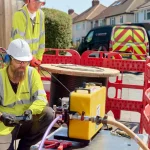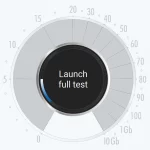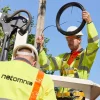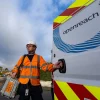Staffordshire, Devon and Somerset UK Prep Future Broadband Rollouts
Several local authorities in England, including Staffordshire, Devon and Somerset, have begun to consult on the next phase of their respective projects for expanding the coverage of “superfast broadband” (30Mbps+) services. Thousands more premises and some FTTP is on the cards.
Both of the new consultations are different in terms of their funding sources and stages of development and we’ve sought to summarise this below, although Staffordshire is currently at a much earlier stage of developing their next expansion scheme.
Staffordshire
At present the existing Superfast Staffordshire project with Openreach (BT) has already made superfast broadband networks available to 95%+ of premises (when you include the city of Stoke) and they’re currently aiming to reach more than 96% by the end of 2018 (here).
Advertisement
The county council has now launched a new Open Market Review (OMR), which will help them to confirm how much of the area has already been covered by such connectivity and how much will be reached by separate commercial deployments over the next 3 years to 2021 (here). Once they’ve identified the remaining area for state aid intervention (deadline for responses is 30th April) then a short 1 month consultation will be run on that too.
The plan for the next contract is apparently to bid for a slice of the relatively small £30m Rural Broadband Infrastructure (DEFRA) fund, which was unveiled last year (here). The fund is so small that the next extension is unlikely to be too significant in size but as the saying goes, every little helps. At the time of writing the local authority has not yet fleshed out their plans.
Devon & Somerset
Meanwhile a more significant development has taken place in the joint £171m Connecting Devon and Somerset (CDS) project, which is the biggest publicly-funded broadband programme in England and that’s largely due to the extremely rural nature of the two counties (it’s considerably more expensive to upgrade rural areas).
Phase 1 and 2 of the CDS scheme focused on expanding the coverage of superfast broadband by working with several different operators, including Openreach (BT), Gigaclear and wireless ISP Airband (details). Sadly CDS has long given up on reporting a % coverage figure for their progress but their original aspiration was to provide “speeds of over 24Mbps to 100% of premises by 2020” (this always looked unlikely to be achieved).
Advertisement
As it stands the overall coverage for both counties is currently sitting a little shy of 90% coverage, although the programme has still helped to expand the availability of superfast broadband to 298,000 premises and a further 38,000 can access “improved broadband speeds” (the latter essentially means they’re covered by a new broadband network [e.g. FTTC] but can’t quite achieve 30Mbps+ speeds).
In total some 952,400 homes and businesses across the whole region now have access to superfast broadband out of a total of 1,083,200 (this includes both commercial deployments and those supported by CDS). Commercially-funded broadband is also forecast to reach a further 14,000 premises across the region by 2020 and the on-going CDS contracts will add a few tens of thousands more by the same date.
The current deployments, including any directly related extensions, are due to complete by December 2020 and so the coverage will continue to grow. In the meantime CDS has this week launched a new Gainshare Public Consultation, which examines how best to commit around £4.8m to £6.8m of reinvestment from clawback back into their deployment programme.
The Broadband Delivery UK framework contracts with BT require that public investment be returned when local take-up of the new networks in related intervention areas goes beyond 20% and this rises as the take-up slowly improves. CDS report that take-up in their deployment areas has already reached 43% (137,600 homes and businesses), hence the above reinvestment opportunity.
Advertisement
Cllr David Hall, Deputy Leader of Somerset County Council, said:
“Every day CDS is connecting more and more people to broadband in some of the hardest to reach rural areas in England. But we are not stopping here, there is more to do to connect isolated communities and boost the local economy. Working with Government and broadband companies, we want to expand the network even further over the next two years.”
The new consultation will run until 26th April 2018 and this will identify the future intervention (NGA White) areas. After that CDS said they would “seek to agree a change with BT to deliver the extended Superfast Broadband; subject to the £4.8m-£6.8m budget and achievement of coverage and value for money criteria“. The desired solution for this is a “full fibre” ultrafast Fibre-to-the-Premises (FTTP) network, although the funding isn’t enough to take this very far.
Separately CDS has also confirmed its plan to launch a new broadband voucher scheme for residents and businesses. The previous scheme is said to have demonstrated the success of this type of support with more than 1,800 installations being completed offering a choice of 4G, fixed-wireless, satellite and “fibre” (FTTC/P) solutions. Details will be published later in the spring.
CDS is also planning to launch schemes to support community broadband solutions in the summer 2018 and if this follows the same format of other local authorities then we’d expect a pot of money to be establish, which can then be used alongside Openreach’s Community Fibre Partnerships or something similar.
Finally, it’s also noted that Gigaclear’s related FTTP rollout has suffered a slight delay in some communities due to the collapse of Carillion but apparently they still expect to complete the overall contract on-time.
Mark is a professional technology writer, IT consultant and computer engineer from Dorset (England), he also founded ISPreview in 1999 and enjoys analysing the latest telecoms and broadband developments. Find me on X (Twitter), Mastodon, Facebook, BlueSky, Threads.net and Linkedin.
« Ofcom Tweak Final Pricing for Openreach 40Mbps FTTC Broadband
















































Comments are closed